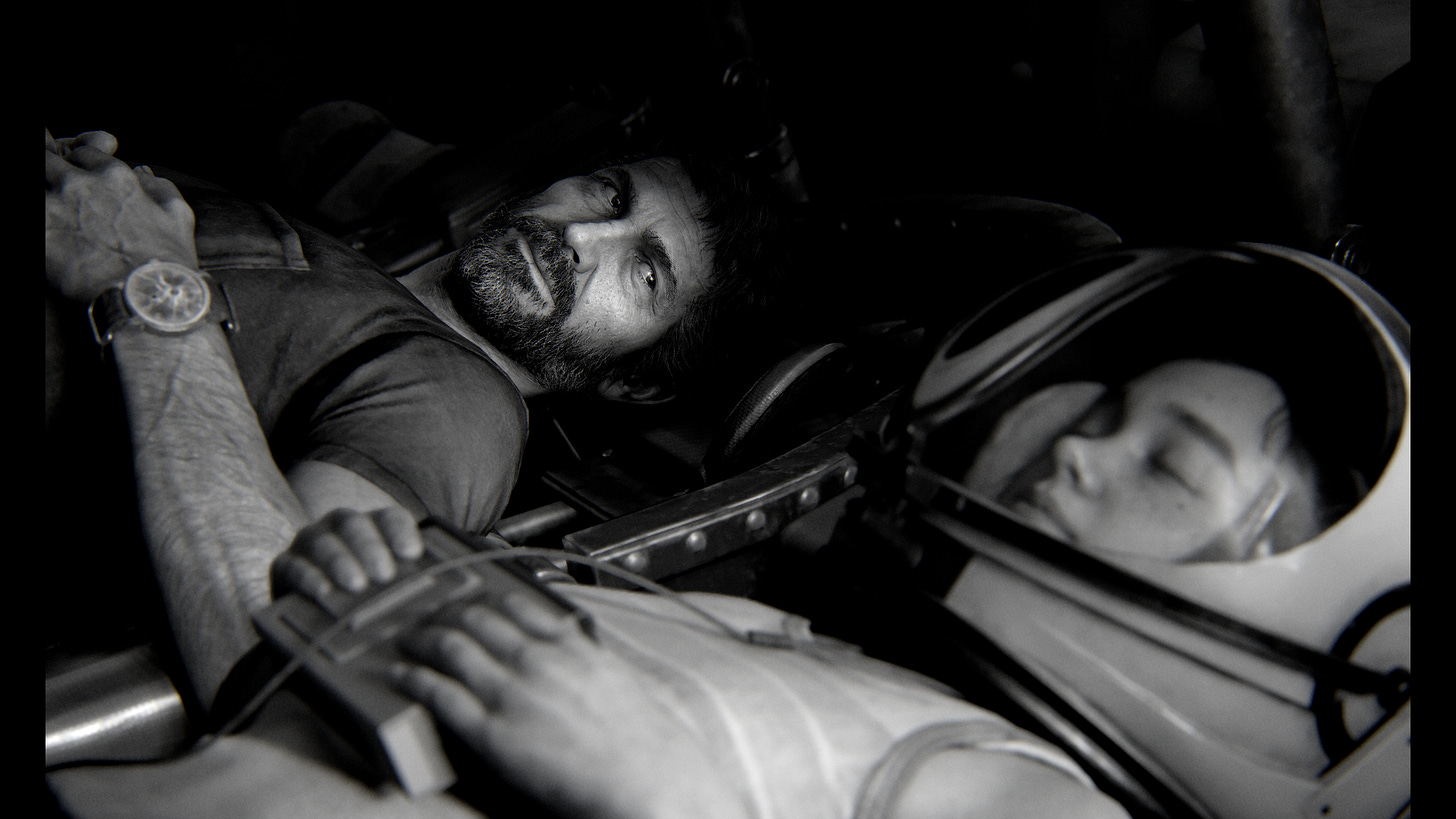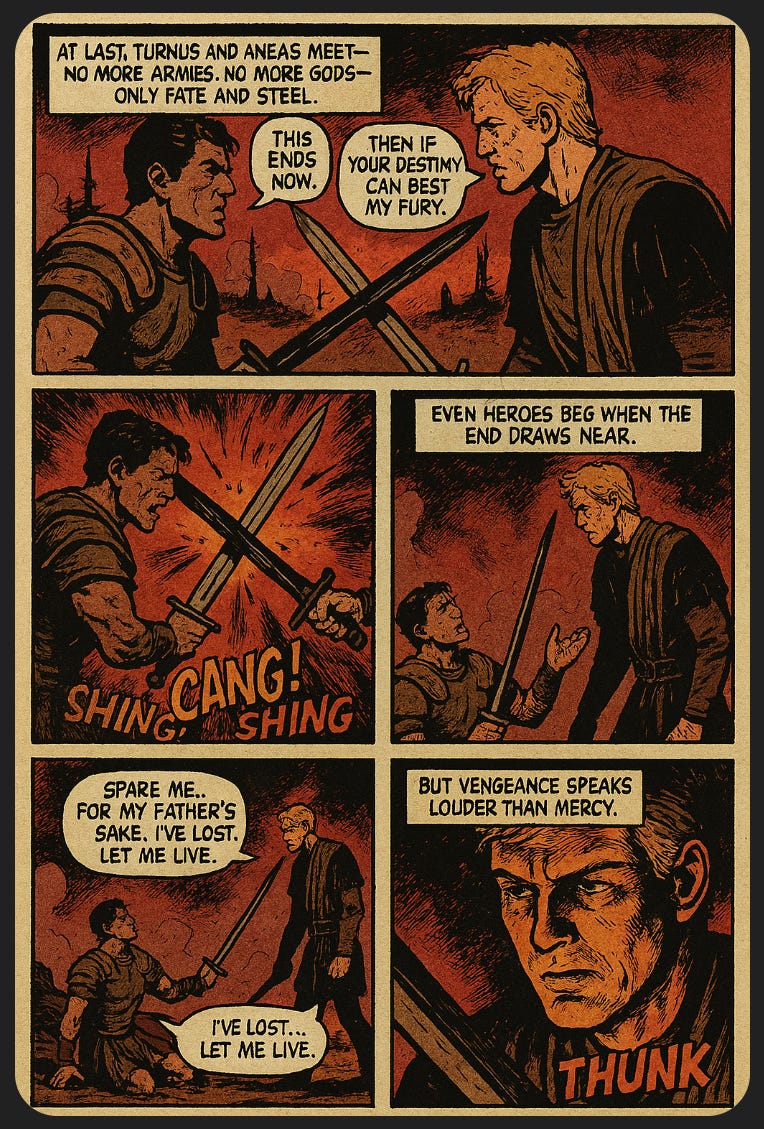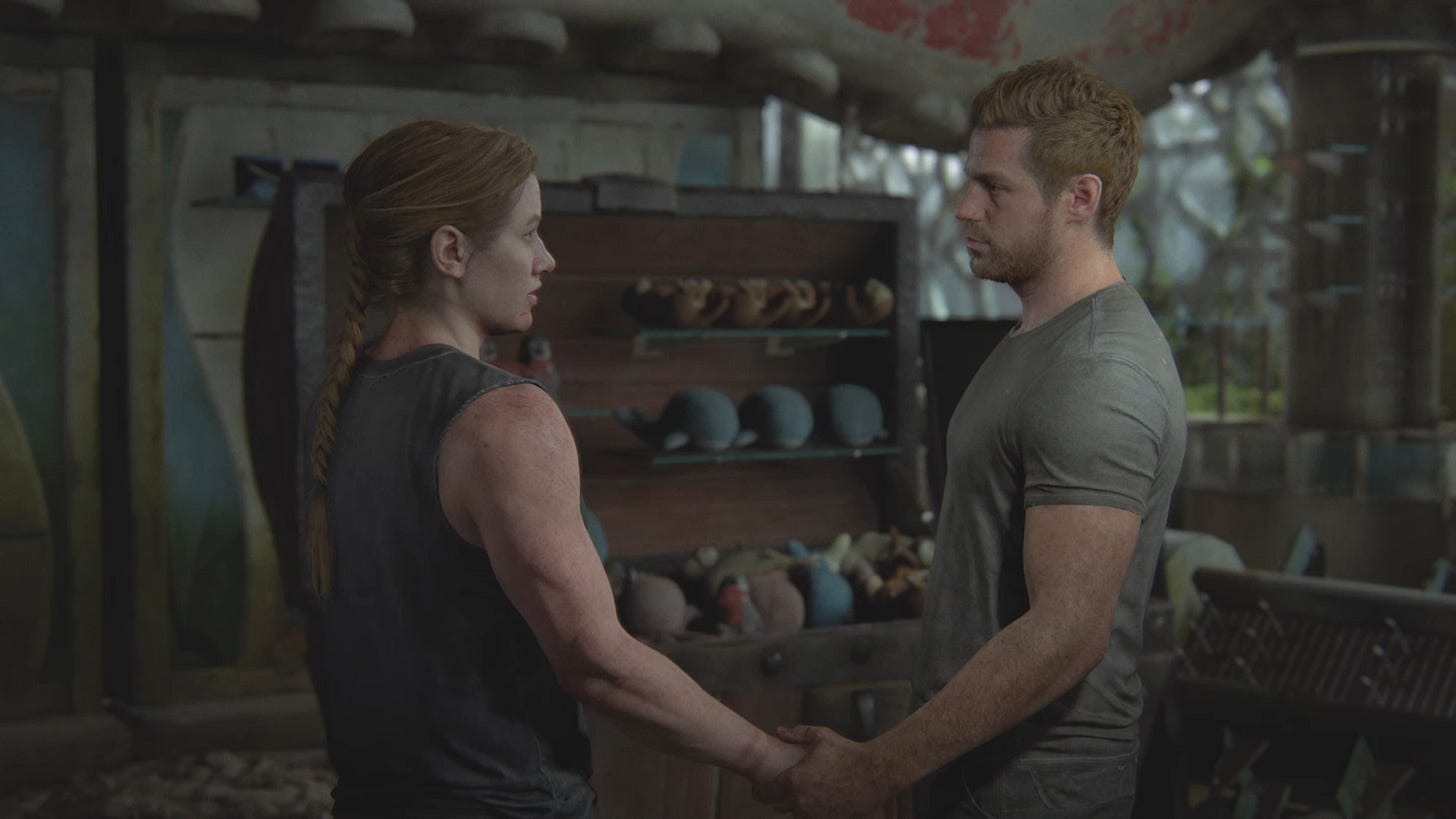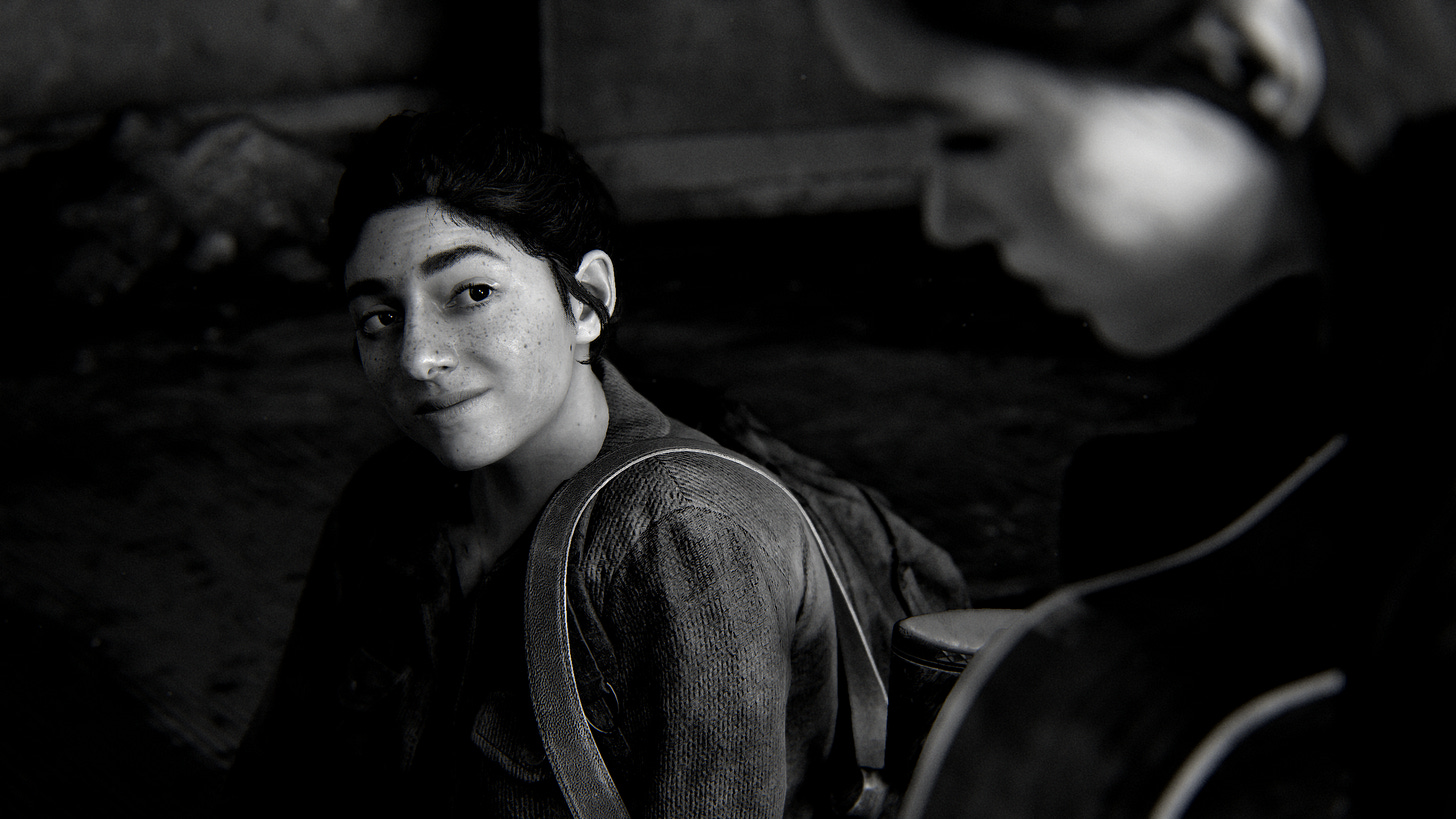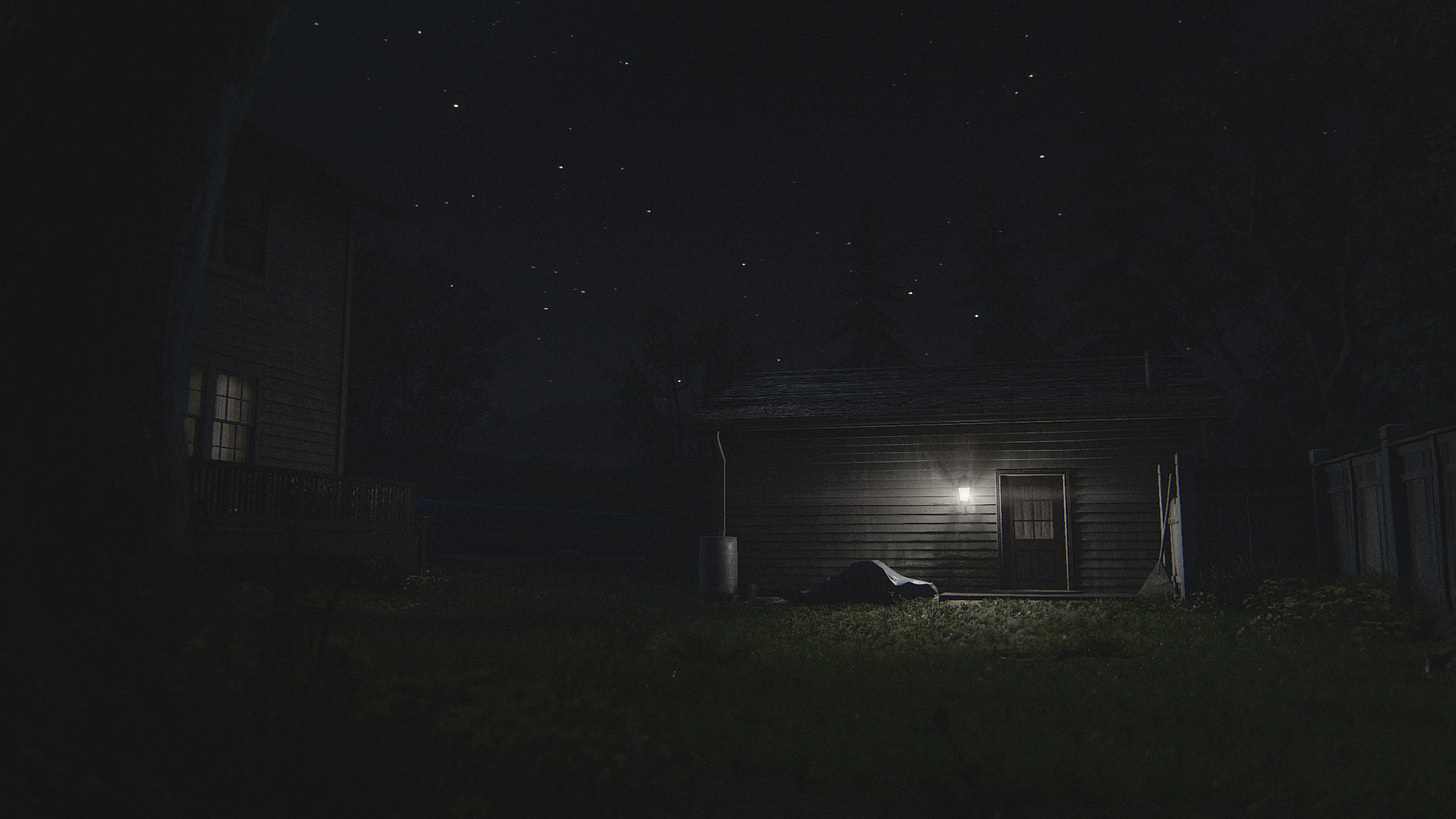Apocalypse, Trauma and Meaning
Narrative Destinies in The Last Of Us and The Aeneid
How much is meaning affected by calamity?
This morning, after talking about his friends, Mama asks the Kid: “OK, but who is your BEST friend?” The answer comes quickly, out of nowhere: a short and unequivocal “Tata” hits my ears like a full-speed train blasting a platform’s bystander. It’s humbling because of the candor and spontaneity that kids are known for, which preclude me from rationalizing or downplaying his statement: it’s as real as they come. But it’s also to the opposite of a bit more than a year ago, when health problems kept me weak, sometimes in acute pain, and I pushed back against avenues of affection.
The interplay between such intensive extremes would’ve seemed impossible to me, before actually living through them. Life seems to be a speck of meaning between maws of nothingness, which are not only the times before and after our beating hearts, but also in the midst of our very lives: events and discoveries that more often than not dismay us and render us unto melancholy and meanness, if not outright depression and incapacity. Have you ever seen a friend’s eyes turn to stillness?
Without knowing, I was primed to spin up The Last Of Us Part 2 (TLOU2): a story of great suffering calling for great vengeance, but also a story asking the question of the interplay between meaning-joy-growth-learning and nothingness-sorrow-brutality-decay. This question is not very far from an aphorism dear to Kant.
Gigni nihilo nihil, nihilum nil posse reverti.
Nothing is born from nothing, towards nothing nothing can return.
(Kant, Critique of Pure Reason)
We and our lives are nothing returning to nothing, but we are also something; and something does not come from nothing. This is the tension of the aphorism, and of human life regardless of income, intellectual endowment, and so on. On the same day, we can be the best friend of our child and be faced with imminent eviction. Regardless if it’s on the same day or not, each and every one of us has felt and lived through the confusion and violence of being thrown between the extremes of meaning and nothingness; similarly, every one has faced an event of great consequence, although it might not have had any particular “reason”.
Meaning and nothingness intertwine so well de facto, even if logically they are contradictory.
This fact brings me into disarray. How could these two extremes manifest such affinity for one another, complete each other so well? Some, like Emerson, will argue that such confrontations are actually desirable, that they produce indestructible fabrics of meaning:
We shun the rugged battle of fate, where strength is born.
(Emerson, Essay on Self-Reliance)
I am not convinced, just as I am skeptical of expressions in the vein of “what doesn’t kill you makes you stronger”: if you’ve been at death’s door, or if you’ve had to bear trauma, I’m not sure it makes you stronger, but I am sure it makes you more nervous and volatile. It can make for a good or interesting story, because it speaks to something faced cannot be forgotten, try as one might.
That’s probably why The Last of Us (and its Part 2, which I’ll be focusing on) is one of many stories taking place among the most rugged and catastrophic conditions of life: it and other narratives benefit from placing their drama and quandary in such extreme conditions. In fact, Virgil’s Aeneid is a document from 19BC (more than 2000 years ago, still readable today) precisely with this apocalyptic flavor, charging Aeneas with the flight from the sacking (and massacre) of the city of Troy, towards the “destiny of founding the greatest city”, Rome. (Augustus, 1st Emperor of Rome commissioned Virgil to write the story, so it is also a propaganda piece, even though it has subversive nuances.)
The Aeneid is packed with instances of great tragedy, so much so that it is questionable whether the main plot is actually about Aeneas, or if that is rather a pretext for the staging of how the human condition must find ways to endure cataclysm. We tend to take things for granted, and use expressions such as “biting the dust” with great self-satisfaction if not even spitefulness; but in the Aeneid we often witness great heroes, related to divinity, whose parents raised them in virgin forests and took every possible care to make them as good as they could be, fall to the ground like great oaks and bite the dust. So many are doomed to this fate, like Pallas:
From, the wide wound he plucks in vain
The reeking weapon out;
The life-blood and the life amain
In mingled torrent spout.
He sinks collapsing on the wound;
About his limbs the arms resound;
And as he writhes in deadly pain
His fierce teeth bite the hostile plain.
(Aeneid, Book X, Conington translation)
Or are they, doomed? This is my guiding question as I continue down this post: is it a tragedy to meet such a meaningless end, all the more so when bearing the history of great meaning? Or is this end, calamitous as it might be, actually powerless as to the meaning it seemingly puts an end to? Might meaning actually be unaffected by calamity?
Place & race, building blocks of meaning
I am very puzzled by the ongoing efforts of the games industry to integrate AI into their workflows, especially to replace writers, visual and voice artists. After finishing the Aeneid a few weeks ago, I asked ChatGPT to generate an image of the story’s end in the style of early Hellblazer issues, and except for the frankly great comedic effect, the result was pretty catastrophic: instead of defiance being humbled and the grace of mercy turning into the cruelty of vengeance, I got basically slop. Have a look.
Impressively absurd, no? The swords inexplicably switch hands, Aeneas’ sentence is an incomplete jumble of a mess, the victor asks for mercy (?!) but then both have lost (?!?), and finally the dramatic THUNK is irrepressibly hilarious in its mystery.
It’s even more impressive in the context of the discussion around meaning-nothingness, because the computer clearly has problems understanding what is going on, even in basic terms of making sense. But that is exactly what this is about: making sense, aka good old-fashioned fresh from the oven meaning. How eloquent that meaning might falter so strongly outside of human hands. We’re on to something.
If the computer doesn’t get it, how come we do? Both The Last of Us and the Aeneid start with the same building block integrated into the structure of their plot and pacing: place. Both narratives make use of place, and more precisely landmarks, to pace and delimit major episodes of the plot. Aeneas travels from the shores of Troy to Carthage, Sicily, minor Greek islands and then around the areas of Tiber river in search of a specific place, the correct one to found his new city; as Ellie (and also Abby) must find her way to and through Seattle, navigating with the help of its landmark buildings that one sees in the distance and must travel towards (a signature Last of Us trope).
But these places are not just pit stops and glorified direction posts: each brings to bear its history which the protagonists must deal with, affecting their journey and character in... meaningful ways. In Carthage, Dido falls in love with Aeneas (with the help of scheming gods) and the ensuing fallout explains why Rome and Carthage will always be enemies. In Seattle, the theatre is a kind of hub whose topography develops as the gameplay moves from act to act and Ellie keeps coming back to it, playing her role and leaving her mark; it is also where the big confrontation will be staged.
In both works, nature plays a critical role in situating and establishing a location’s degrees of freedom, both physical and symbolic. Aeneas must travel by boat, and his relationship to great bodies of water comes to define the ways in which the cycle of time is understood; similarly trees and forests are most often symbols of chastity and piety, vessels in which the practice of virtue has been stored (trees are rather considered as carbon sinks in our time). Ellie and Abby’s story is also deeply embedded in the workings of nature, and more precisely its evolution: they are at the mercy of the cordyceps evolution/mutation, the very cause of the apocalyptic character of their lives; but they are also witness to the way in which flora and fauna are reclaiming the face of the quintessential human setting of the city. For both works, nature is often a symbolic compensation for the moral and material difficulty the characters find themselves in: its utter beauty and stillness, as well as mesmerizing complexity, are balms to the pains and injustices they are faced with.
Place, then, is the first elementary elaboration of meaning: through the direction that landmarks establish, and through the perspective that nature instills in the face of tribulation. Race follows: having a common language, culture, and traditions/history. Race also includes the relationships that come to define us, insofar as we are changed by those who inspire us but also in the way in which we become indebted to those who have helped and bettered us. But race is also trauma: I once heard it defined as “an experience so intense your nervous system just can’t process it”. That definition has stayed with me.
In both works, traumatic events are at the root of the protagonist’s matrix of understanding. Troy, the “shining city on the hill” of Antiquity, has fallen, sacked and burned, its heroes massacred; Hector, its pride and joy, has been killed and dragged around the city’s walls, three times at that; Aeneas’ wife Creusa dies and only appears to him as a spectre enjoining him to move on.
'Why grieve so madly, husband mine?
Nought here has chanced without design:
Fate and the Sire of all decree
Creusa shall not cross the sea.
[…]
Heaven's mighty Mother keeps me here:
Farewell, and hold our offspring dear.'
(Aeneid, Book II, Conington translation)
In much the same way, the heroines of TLOU2 lead lives, before and after, marked by trauma; indeed, marked so deeply that they can never go back to normal. Ellie sees flashes of Joel’s death when a barn door slams shut; Abby, too, can never escape from the vicious cycle of the vendetta. This is maybe the point where the two works are the most contrasting: in the game, it is revenge that leads, fuels, drives and relentlessly hounds the protagonists, while the poem is much more rich and developed as to the ideals, traditions and relationships the characters are devoted to; of course, there’s also the fact that the two stories are products of their own times, which is why TLOU2 focuses so much of its character-building on the individualistic formation of relationships, while the Aeneid puts a lot more emphasis on lineage and honour, social markers of worth from more collectivist organizations of society; Ellie wears a pin from her visit to the museum with Joel, but Aeneas carries with him the gods of his ancestors.
It bears noting, as a final observation on the way these stories build this side of meaning of their dynamism, that musicality plays a role for both. TLOU2’s soundtrack makes extensive use, both implicitly (the game’s tracks) and explicitly (Ellie’s occasional guitar playing), of chords in a style where they seem, with some melancholy, to be “speaking” to each other. Likewise, the Aeneid is a poem which is different from contemporary poetry in that it does not rhyme, but its music is rather based on the length of syllables, as it was for Latin poetry in general; to this are added various other audible effects such as assonance (repetition of sounds in nearby words) and alliteration (repetition of syllable-initial consonant sounds between nearby words), eg. “egō sum Via et Vēritās et Vīta”. I think this opens up the whole dimension of why music makes so much sense to so many people; so many of our best and worst memories are intertwined in the music we listened to at the time. These stories and their authors understand that: both plunge deep into the power of music in structuring and reinforcing the meaning that takes root within us and within those who matter to us.
Decimation by destiny: to defy and to defer
Towards the end of one of, if not the, best set-piece of TLOU2 (where Tommy is sniping Abby and Manny), it seems the two have managed to corner the enemy but, a bit out of nowhere and after what should’ve been a no-risk maneuver, Manny’s head is blown clean off, on-camera and all; this was a pretty animated guy, a good friend to Abby and a capable soldier all-in-all; and he lost his life in this insignificant way, to what seems to be just bad luck.
Young Menoetes was a fisher, whose father was poor and tilled the land of another, and he abhorred war; yet he falls unceremoniously on the field of the Aeneid’s final battle. Even more cruel is the fate of Argos’ Antores :
Now, prostrate by an unmeant wound,
In death he welters on the ground,
And gazing on Italian skies
Of his loved Argos dreams, and dies.
(Aeneid, Book X)
In one of the most poignant passages of the whole story (Book VI), Virgil describes the masses huddled on the shores of the Acheron, waiting to be ferried into the underworld: there are mothers, husbands, faint shadows of lifeless heroes, infants, women waiting to be married, youth mourned by their families, “as numerous as leaves falling in forests at the first frost of autumn”. TLOU2 also puts countless characters in the way of its protagonists, and many of them are often dispatched by way of explicitly murderous animations; when not killed at the hand of the player, many are transformed into infected, a fate worse than death, and often the game will expose the player, by way of scribbled paper and contextual staging, about the last struggles and hopes of people who were trying to survive.
Both works aptly and repeatedly make reference to this kind of destiny to perish or to face some kind of decimation of body or mind. In the “afterlife” of Tartarus, Aeneas finds Dido in a hellish labyrinth covered by the forest’s shadow, infinitely recommencing the search of some secret love, tortured even in death; Ellie is stuck between her hatred for those who killed Joel, but also her betrayal by Joel himself, who lied to her about what was most important for her. Everyone seems to live in a kind of broken-down version of something that mattered to them, condemned by destiny to endure, maybe hopelessly.
Una salus victis, nullant sperare salutem.
The conquered have only one salvation, to hope for nothing.
(From the Aeneid)
It would be abusive to simply say that this is the other extreme of meaningfulness: rather, these two extremes constantly bounce off each other. Place and race often take form precisely in relation to the tribulations and decimations a person is faced with. Take the example of the ultimate destruction a person may face, war: before old traditions started to be put aside, the Romans sealed the temple of war with 100 bolts, and declaring war had to be followed with the consul unlocking each and every one of those bolts in a meticulous ceremony, because the cruel character of this machine of death had to be highlighted in some overt way. Similarly, the fanatical zeal of TLOU2’s Seraphim faction is a direct response to the corruption, brutality and anarchy that sprang up precisely after the onset of the apocalypse: an abstract and divine desire contrary to unbearable earthly conditions; the Seraphims build literal bridges between skyscrapers, their secret faith made real in its verticality.
But these are never solutions, but rather manifestations of the struggles of a society and its people. It would seem that, most often, problems cannot be solved, but must be sublimated somehow.
And if not sublimated, there is always defiance. In the Aeneid, the character of Turnus plays this role: he is magnificent, glorious and supremely confident in his capacities: his demeanour would state “I have already won”. Even in the face of the horrible jealousy and deception of the gods, in the face of destiny itself, he refuses any compromise:
If 'tis on me the Trojans call
And my one life imperils all,
Not all so weak these hands of mine
That I the combat should decline.
Nay, though Achilles' self be there
And Vulcan make him arms to wear,
I yet will meet him. Here I stand,
I, Turnus, like my fathers manned.
(Aeneid, Book XI)
Let’s be serious: in terms of plain uncompromising defiance, there is no comparison with Turnus in The Last of Us. But the sheen of the common sense “we do what we must to survive” does wear off their characters, and spills into something close to defiance: Ellie abandons a pretty good family life because she cannot let go of her grief and desire for vengeance, and Abby goes to extremes against the orders of her unit to help some strangers because she feels the need to atone for her actions, even if she still considers those actions morally valid. In both these cases, there is a need and an undying yearning to make things well, to go to the ends of the earth against an unacceptable/bleak reality. In this sense, it’s still a form of defiance. Many other great stories, and I think of Better Call Saul now, make use of these forms of defiance to make their characters lovable and magnetic.
In the end, the question becomes more simple, yet also more complicated: despite sublimation and defiance, insoluble existential problems still stand. Endlessly they find crevices in the ramparts of our mind; and should we ignore them, crevices become fissures threatening collapse.
The spectre of defeat, disease or death is a revenant. Even if dispelled for a while, it always returns, always dramatically; and its aspect of invincibility is ultimately humbling. Turnus becomes nice once defeated, and asks for mercy for his father and his people. Ellie forces an emaciated and destroyed Abby to fight her but cannot finish because she is humbled by the impotency of her desire for vengeance, in a world that has moved on from the drama that has structured her.
These are the limits to the strategies of defying and deferring the existential. On the one hand, ego drives for power despite ultimate mortality; on the other hand, the world moves on from what it was when it made us.
The Aeneid and TLOU2 each subtly tackles this conundrum in their contextual allusions.
Nature can be even more than the meaning and freedom we’ve already discussed above. TLOU2 takes place in a world reclaimed by nature, and the Aeneid’s heroes are all literally descended from the piety of their forefathers for trees and forests. In both works, it provides a field making territorialization possible again, insofar as it precisely encapsulates a totality within which we can derive belonging and, from this, at-peace-humility and stewardship.
Religion as a kind of devotion and commitment acts as a channel human beings can form according to their specific practical habits. In the Aeneid, indeed this often takes the form of invocation to gods in guiding their hand and intention, but it’s also subtly represented as a commitment to wisdom, such as by its maxim that patience conquers fortune. In TLOU2, music and the guitar represent Ellie and Joel’s devotion for one another, and Ellie’s occasional song (started by a string mini-game) enables her to channel both her “descendance” from Joel (who also played and taught her to play) and the depths of her emotions and existential burdens.
Finally, and most implicitly, both are works of art, and as such have at their heart precisely an impetus for creation, exploration and experimentation. And these are all light-hearted endeavours: even Kant’s Critique of Pure Reason, dense and systematically rigorous as it might be, is filled with jokes and other forms of dry humour or sarcasm. This impetus is the opposite of tragedy, in the classical sense of being doomed, and, as such, as a comédie humaine, it also has the constitutive resources to make space and time for a transformation of causality into freedom.
We have a stable consideration of the many things that seemed important to the question, but the question from the beginning remains: meaningful, are we doomed to suffer meaninglessness? We know for sure that we are facing an existential condition, which means that no matter the answer, the question will remain. Even if we ignore it. It comes back, always, to give a good knock to the doors of consciousness; and would we put 100 bolts to those doors, it would still find a way through.
My own answer to the question is already imprinted unto these characters and those before them. These two works of art have helped me go far down the road of this question which has often haunted me, the more so as I tried to be very uncompromising in the past. And for me it will be very important to keep baking bread, as a way of being in the world. It’s my answer to the prospect of doom.
--
If you’ve come so far, it means some of this has spoken to you, for which I’m glad. Feel free to sound off in the comments if you have any thoughts which you would like to share on the subject, whether on existentialism, on the Aeneid or on The Last of Us games. This is very likely the end of the series on narrative destinies: narratives will continue to be the prime ingredient for my interest, but I find myself also hungering for other ways that games foster imagination.
A guest article celebrating one year of Interfaces of Play might also be in the works.


